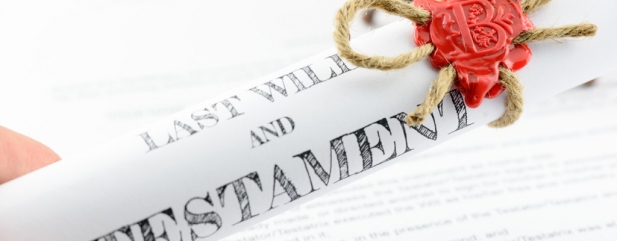Archived article
Please note that tax, investment, pension and ISA rules can change and the information and any views contained in this article may now be inaccurate.
What to do if you inherit a stocks and shares ISA

Inheriting a stocks and shares ISA could make your financial situation a lot more secure. But there’s a high chance the assets you inherit will be unsuitable for your own individual circumstances.
If you’ve never owned shares but your dearly departed was a keen and experienced trader with an appetite for high risk businesses, it’s possible the portfolio will be too risky for you.
In contrast, if you’ve inherited lots of cautious, income-producing funds but you’re young and have a high risk tolerance, the portfolio won’t necessarily provide the long-term growth you need.
Ensuring the assets are right for you is incredibly important.
What am I inheriting?
An ISA is simply a tax wrapper. It’s the investments that are held inside the ISA which are important.
A stocks and shares ISA can contain a wide range of investments, including shares, funds, corporate bonds and investment trusts, all of which will have varying degrees of risk.
If you inherit these assets, you should carefully assess each of the holdings to ensure they’re appropriate for you.
‘What was right for your partner, or for you both when they were bought, may not be right now,’ says Charles Calkin, a financial planner at James Hambro & Co.
Reviewing the assets is especially important if the deceased was responsible for making the investment decisions.
Carl Lamb, managing director at Almary Green Investments, says you need to determine your attitude to risk, capacity for loss and financial goals.
Your attitude to risk is your subjective view of investment risk. Your capacity for loss is how much money you could afford to lose.
‘Your investment choices should also depend on your objectives and timescales. Any short-term objectives (within five years) are best saved in cash.
‘With longer-term objectives (five or more years) investing provides the potential to provide returns in excess of inflation, but also carries the risk of losing money,’ says Lamb.
I’ve inherited shares but I’m a novice
If you’ve inherited lots of shares but you’ve never traded before it can be pretty daunting. A portfolio consisting entirely of shares is likely to sit near the top of the risk spectrum. Shares provide the opportunity for higher growth over the long term, but they also carry the risk of larger losses.
‘Some companies have long, positive histories and their shareholders have been rewarded for their loyalty,
but there are also many that have folded, so it pays to monitor the strength of the firm,’ says Calkin. ‘I’d be particularly wary if someone had a lot of money in one particular company’s shares.’
Ryan Hughes, head of fund selection at AJ Bell Youinvest, says you effectively have three choices if you inherit individual stocks: brush up on your knowledge and manage the shares yourself; change the holdings into something you’re comfortable with; or appoint an expert to look after the shares for you.
‘Ultimately, if holding direct equities is outside of your risk tolerance, then these should be changed into something you are more comfortable with,’ he adds. Equities is another word for stocks and shares.
The assets are too cautious
If the deceased was old and retired, it’s likely their portfolio consisted of cautious, income-producing assets.
If you’re young you can afford to take on more risk because you have a long enough investment time horizon to ride out stock market volatility.
Growth assets are more likely to be suitable for someone who is still working, whereas a retiree might need dividend-paying assets.
Hughes says there’s no point holding assets that are outside your investment strategy because they could unbalance your overall portfolio.
The ISA inheritance rules
You can inherit the assets in an ISA if they’re left to you in the deceased’s will. There are different rules depending on whether the deceased was your spouse or not.
I’m their spouse
Since April 2015, a surviving spouse or civil partner can inherit the value of the deceased’s ISA investments without losing the tax benefits.
The surviving partner is entitled to an Additional Permitted Subscription (APS). This is a one-off additional ISA subscription on top of your normal annual ISA allowance. The APS is equivalent to the value of the deceased’s ISA(s) at the date of their death.
These rules don’t entitle the surviving spouse to the underlying assets – you’ll only get the assets if they were left to you in the will. Either way, you can still claim the additional ISA subscription.
I’m not their spouse
If you’re the child of the deceased, or any other person named in the will, the ISA wrapper will fall away and any income will be subject to normal tax rules.
If you sell the assets, they’ll be subject to capital gains tax from the valuation at the date of death.
This means the sooner you can move the assets into your own ISA, the better.
‘If it means that changes need to be made, these should be taken sooner rather than later. However, it is always important to research the investments carefully and ensure that you are making a considered judgement,’ explains Hughes.
How do I minimise transaction costs?
Transaction costs are an important consideration when changing investments because they can eat into your overall returns.
Moving your assets to an online platform will make it easier to trade, monitor the performance of your portfolio and help to reduce costs.
If you’re able to retain the ISA wrapper you can make changes free of capital gains tax.
Platforms charge for buying and selling investments. For shares it’s usually around £10 per trade whereas for funds it’s around £1.50 or in some instances free.
Hughes says transaction costs shouldn’t prevent you from changing your investments.
‘If the investments are not appropriate for you, this is a bigger issue than trying to save a few pounds in transaction costs,’ he adds.
AN EXAMPLE OF AN INHERITED INVESTMENT ISA
Inheriting investments is exciting… but what’s relevant to one person might not be relevant to someone else.
Let’s say you inherited a portfolio of oil and gas stocks, meaning you own high risk individual companies. This sector can be very volatile in terms of share price performance. It is really difficult to forecast earnings for this sector and oil prices have historically seen wild swings up and down.
If you’re 50, for example, and want to bolster your retirement savings, you may prefer to sell the oil stocks and reinvest in companies operating in more reliable industries and which have a good record of dividend growth.
By reinvesting all dividends you can enjoy compounding benefits, so hopefully the inherited portfolio will have grown in value by a decent amount by the time you retire and provide welcome financial support once you leave full time work.
The alternative is to risk keeping the oil stocks and pray that oil prices don’t experience another sell-off like the one we saw a few years ago.
Important information:
These articles are provided by Shares magazine which is published by AJ Bell Media, a part of AJ Bell. Shares is not written by AJ Bell.
Shares is provided for your general information and use and is not a personal recommendation to invest. It is not intended to be relied upon by you in making or not making any investment decisions. The investments referred to in these articles will not be suitable for all investors. If in doubt please seek appropriate independent financial advice.
Investors acting on the information in these articles do so at their own risk and AJ Bell Media and its staff do not accept liability for losses suffered by investors as a result of their investment decisions.
Issue contents
Big News
- 21 investment trusts now considered ‘dividend heroes’
- Fire safety expert Marlowe reports surge in interest
- FTSE 100 stocks with superior dividend growth
- AA refinances debt to cut annual charges
- Takeover bid for FTSE 100 stock Worldpay
- Significant development in US sports betting market
- Inmarsat sweats on satellites battle
- Three UK stocks grab place on ‘high quality dividend’ list

 magazine
magazine








